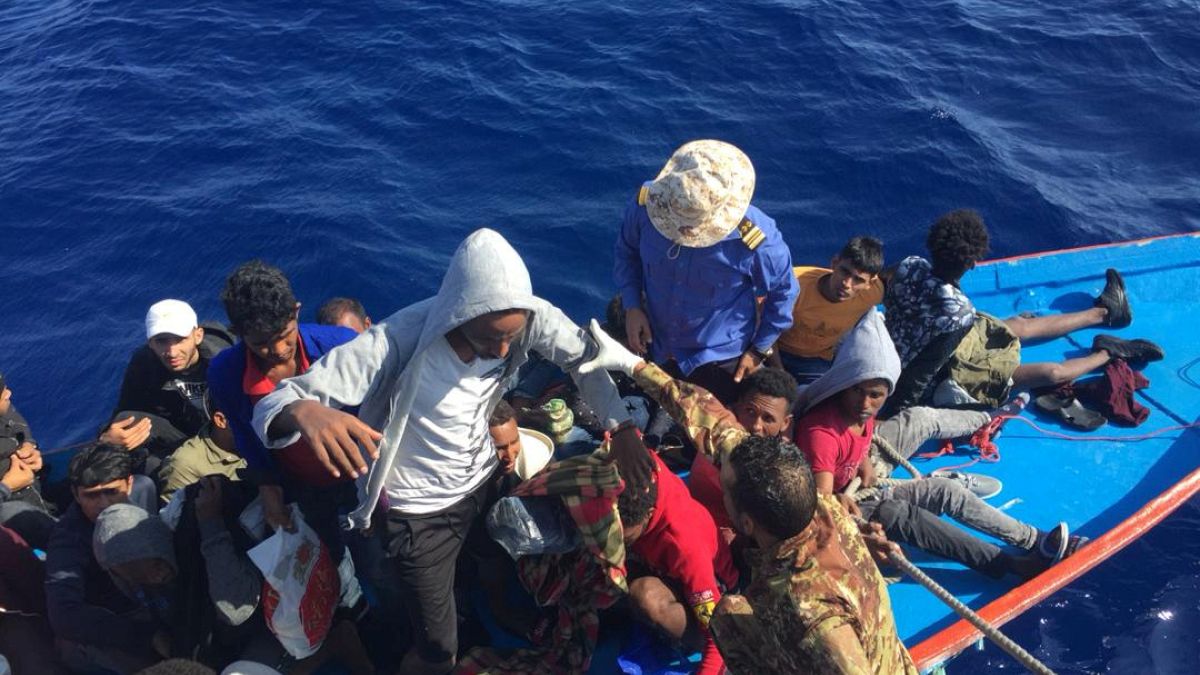While the military mission called Eunavfor Med - Operation Sophia (ENFM) is in charge of training and evaluating LCG, its staff is not permitted to set foot in the country due to security conditions.
In the past two years, the EU has spent more than 90 million euros funding and training the Libyan Coast Guard (LCG) in an attempt to keep migrants out of the continent.
Yet a leaked EU report seen by Euronews suggests that the bloc's ability to monitor LCG's activity is limited at best.
The report in question was sent in July this year by the European External Action Service to member states' ambassadors.
While the military mission called Eunavfor Med - Operation Sophia (ENFM) is in charge of training and evaluating LCG, its staff is not permitted to set foot in the country due to security conditions.
“It is important to underline that any monitoring activity ashore will be conditional to the improvement of the overall security situation in Libya, which at the moment doesn't allow any ENFM personnel to enter the country,” the report said
Operation Sophia can speak “by phone call and online chat” with the LCG or hold periodic meetings with them but has no authorisation to go onboard of Libyan vessels or operate in Libyan waters.
EU says model 'successful'
Launched in 2015, Eunavfor Med so far has trained 355 Libyan personnel with a view to "help to offset any perception of an EU disengagement from Libya," the report said.
According to the report, EU's work to build capacities of the Libyan Coast Guard has been a success.
“The reduced migrants flow in the Mediterranean Sea proves today that the model described above has been successful,” the report said.
But humanitarians' accounts of the situation off the Libyan coast tell a very different story.
Last week, German NGO Sea-Eye accused the Libyan Coast Guard of pointing guns at rescuers and migrants.
In September, a Sudanese man was shot dead just hours after the Libyan Coast Guard returned him to shore, the UN's migration body said.
Human rights groups have furthermore accused armed groups and members of the coast guard of being involved in human trafficking.
'Toothless monitoring'
Andrej Hunko, a spokesman for the German DIE LINKE party in the German Bundestag told Euronews: “The European Commission gave GoPro cameras to the so-called Libyan Coast Guard to monitor their human rights violations.
The patrol boats of the "Bigliani" class are also equipped with cameras to be switched on by the crew. The videos recorded during missions should then be uploaded to Eunavfor-Med for evaluation.”
“However, I am convinced that no incriminating recordings will find their way into the toothless monitoring and advising mechanism with which the European Union wants to hold the Libyans accountable,” Hunko continued.
“In fact, the Commission writes that quality and the number of videos provided are not yet sufficient, and that the so-called Coast Guard and Navy have difficulty uploading the recordings due to a lack of a reliable Internet connection. I think this is an excuse because the so-called Coast Guard is quite active on social media, so it cannot be the fault of the Internet”.
Hunko believes that real monitoring should also include sanctions, as pointed out by the Parliamentary Assembly of the Council of Europe - of which he is a member.
LCG picks independently the participants of the EU training. “Since it is not on the ground, the EU has limited capacity to understand who these people are”, said Chiara Loschi, a researcher on interagency cooperation for the University of Vienna and author of a study on this topic.
Human rights are treated as two modules within the EU training courses offered to the LCG: in some cases “a checklist mentality might have taken precedence over a genuine commitment to core EU values”, Loschi wrote in her study.
The leaked report indicates that, since December 2018, the vetting mechanism has not barred any of the last 35 trainees who applied for a job in the Libyan Coast Guard.
According to a study of the Vrije Universiteit Amsterdam, it is the same Libyan personnel “monitoring and drafting reports about themselves. Unsurprisingly, the Libyan Coast Guard has not reported any abuses”.
ICC submission
Omer Shatz, an international law lecturer at the Paris Institute of Political Studies (SciencesPo), was involved in drafting a communication to the International Criminal Court calling for the prosecution of EU institutions over migrant deaths.
He argues that EU institutions are the political entity which designed, planned and orchestrated a “criminal” response to the migrants' crisis and then sub-contracted its execution on the ground.
“In our case, those who planned the policy, those provided the multi-faceted material, strategic and legal support (...) is the EU”, he told Euronews.
Euronews reached out to Eunavfor-Med but the agency told Euronews it wasn't able to comment on a leaked document.
The Italian Interior Ministry (which leads the Sophia mission) and the European Commission have not responded to our request for comments.
